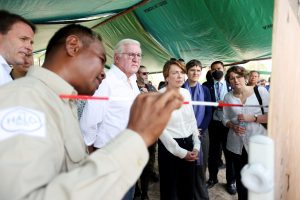At the end of January, the office of German President Frank-Walter Steinmeier announced that he would make an official visit to Cambodia and Malaysia in mid-February, the first visit by a German head of state to Cambodia and the first by a German president to Malaysia since 1986. The official purpose of the trip, which will run from February 13 to 19, is intended to underline Germany’s foreign policy goal of diversifying its political and economic relations.
This goal is consistent with the political turning of times, or Zeitenwende, announced by Chancellor Olaf Scholz after the Russian invasion of Ukraine last year. Since Germany is looking for new partners, it should be considered what interests the country is pursuing in Cambodia and Malaysia based on the already existing relations and what the potential for the two Southeast Asian countries might be, considering Steinmeier will be followed by a business delegation.
German relations with Cambodia are based primarily on development cooperation, such as German support for reconciliation and demining projects. In recent years, Cambodian exports to Germany, which consist mainly of textiles and shoes, have increased many times over, yet the trading volume is small in the grand scheme of things. In addition, many German enterprises have settled in the Kingdom. However, economic relations between the two countries experienced a severe setback in 2020 when Cambodia lost a portion of its duty-free access to the European single market under the Everything But Arms (EBA) initiative due to human rights concerns.
German and Cambodian stakeholders view German-Cambodian relations as balanced and positive overall, with common interests in deepening economic and socio-cultural relations. However, perspectives differ on, inter alia, the development potential of political relations, particularly regarding the democratization process in Cambodia.
Since Cambodia is perceived to be one of China’s closest partners in the Association of Southeast Asian Nations (ASEAN), Steinmeier’s visit can be seen in the context of the growing great power rivalry between the United States and China. As the economic potential of Cambodia is limited, purely due to the small size of the Cambodian economy, the German interest in Cambodia should be seen more from a strategic-political than from an economic angle. However, Steinmeier’s visit offers the Kingdom an opportunity to get in touch with German business, as the German Asia-Pacific Business Association was tasked by the president’s office to assemble a business delegation. This could help foster the diversification of Cambodia’s economic ties and draw more European investment, which is needed to ensure industrial upgrades and success in becoming a higher middle-income country, as pursued by the Hun Sen government.
Malaysia presents a different picture. Germany and Malaysia have maintained close economic relations for years. Alongside Singapore, Malaysia is Germany’s most important trading partner in Southeast Asia, ranking in the top 40 of Germany’s trading partners globally. More than 700 German enterprises have settled offshoots in Malaysia and the country produces key commodities needed by German industry, such as rubber and petroleum products. The high economic relevance of Malaysia is also mirrored in the upcoming economic roundtable with German and Malaysian business leaders. German-Malaysian relations have been historically dominated by business and trade, yet in recent years the relationship has flourished by increasingly embracing political cooperation, especially considering Malaysia’s key role in ASEAN.
While Malaysia has considerably better relations with the West than Cambodia, it too makes little effort to hide its good relations with China. Considering the country’s developed economy, natural resources, and strategically important position on the Strait of Malacca, enhancing relations with Malaysia is a key objective in the context of Germany’s renewed commitment to forge closer ties with ASEAN. Thus, the Steinmeier visit offers Malaysia the potential to deepen economic ties with Germany to accelerate further economic development, as well as strengthen political ties with Germany as a key player in the European Union.
Steinmeier’s visit continues German efforts already highlighted by last year’s visit of Chancellor Scholz to Vietnam and Singapore. The renewed German interest in the Asia-Pacific is bound into efforts to diversify political, but mostly economic ties, to reduce economic (co-)dependency, especially with China. As the war in Ukraine toppled Berlin’s longstanding policy doctrines, the countries of Southeast Asia could potentially profit from significant increases in trade with and investment from Germany. However, whether the German side pushes through with its proclaimed goal of fostering closer ties with Southeast Asia remains to be seen.

































